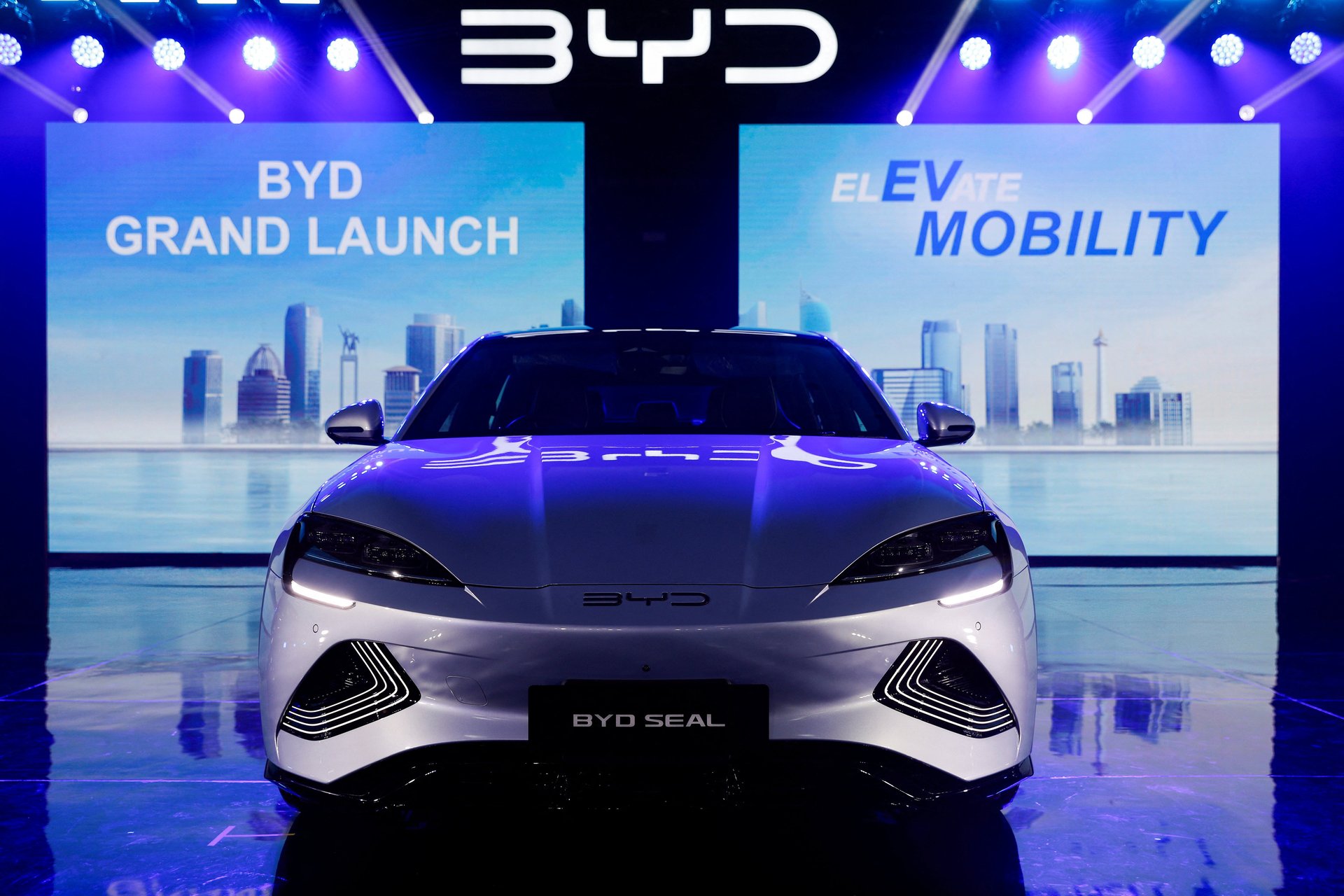Tesla rival BYD is officially a bigger deal than Elon Musk would like to admit
The Chinese automaker reported strong net profits in 2023 as it became the top electric vehicle seller

BYD reported an increase in net profit for the final quarter of 2023 as it dethroned Elon Musk’s Tesla to become the top quarterly seller of electric vehicles in the world.
Suggested Reading
The Shenzhen, China-based carmaker saw net profit increase 19% year-over-year during the last three months of the year, reaching 8.67 billion ($1.20 billion). Revenue grew 15% to 180.04 billion yuan ($24.9 billion). For the full year, BYD’s net profit climbed 81% to 30 billion yuan ($4.2 billion) and gross profit margins jumped to 20% from 17% compared to a year prior.
Related Content
Sales volume for the fourth quarter grew 38%, as the company sold more than 526,000 EVs, nearly 80,000 more than Tesla.
Warren Buffett-backed BYD also made more cars than Tesla for the second year in a row, producing 3 million new energy vehicles (NEV) — which includes both hybrid and battery EVs — compared to Tesla’s 1.84 million. Plus, most of BYD’s cars sell at a lower price range than Tesla’s and can be purchased as hybrid vehicles or fully electric vehicles.
Despite past mockery — including outright insulting BYD’s vehicles — Musk has recently acknowledged the growing threat of BYD in the EV market.
“Frankly, if there are not trade barriers established, they will pretty much demolish most other car companies in the world,” Musk said in January.
However, BYD’s profit in the fourth quarter slipped from 10.41 billion yuan ($1.44 billion) in the previous three month period as competition hardened in the Chinese market. Competition has only grown fiercer in recent months, as EV makers restart last summer’s price war and offer greater incentives and slash price tags to lure customers.
BYD has launched — and subsequently intensified — the conflict over prices in China in recent months by repeatedly slashing prices and introducing a slew of new vehicles across its brands, including the cheaper-than-ever e2 and Seagull electric hatchbacks. That followed last year’s expansion of BYD’s lineup, which included the addition of several models to markets across the world. For example, BYD last March began selling three pure electric models in Mexico.
China’s auto industry recorded an average profit margin of 5% last year, compared with 5.7% in 2022, according to data from the Chinese Passenger Car Association.
“We believe price competition will persist in 2024 and will spur [manufacturers] to expand their cost-cutting efforts [in China],” Morgan Stanley analyst Adam Jonas wrote in a note to investors earlier this month.
An ever-growing machine
BYD’s growth is largely fueled by generous subsidies from Beijing, which has heavily invested in many local automakers. The European Union has launched an investigation into China’s practices, which has seen the government invest billions of dollars to give local brands a leg up on the competition.
“Global markets are now flooded with cheaper Chinese electric cars, and their price is kept artificially low by huge state subsidies,” European Commission President Ursula von der Leyen said last September. “This is distorting our market.”
Chinese car exports have surged as its manufacturers have aggressively expanded overseas. Japan — the world’s top exporter of cars since 2017 — lost that title to China in 2023, exporting 4.42 million vehicles to China’s 4.91 million.
BYD executives have rejected the EU’s accusations that its success has been buoyed by subsidies, instead saying it’s because it invested in better technology “much earlier” than competitors. China on Tuesday filed a complaint with the World Trade Organization against the U.S., claiming that a $7,500 U.S. tax credit for certain EVs is discriminatory.
BYD last year sold its products in more than 50 countries, including Australia, the United Arab Emirates, and Japan, and it said Tuesday that it won “first place” in NEV sales in “many countries.” BYD exported more than 242,000 units last year.
The automaker said Tuesday that it expects China’s NEV market to grow strongly in 2024 and reaffirmed its multi-brand strategy and pursuit of global expansion.
BYD plans to build a new factory in Hungary and recently delivered its first batch of EVs to customers there. The automaker has called it “a new chapter in developing the Central and Eastern European market.” Europe accounts for one-third of China’s total EV exports.
And BYD plans to revitalize a former Ford Motor Co. manufacturing hub in Brazil, investing 3 billion reais ($620 million) to improve its profile in South America. It will build three factories at the industrial complex in the northeastern state of Bahia, which will collectively process locally-mined lithium and iron phosphate and produce vehicles.
The company has also expressed interest in building a new factory in Mexico, with a location expected to be chosen by the end of next year.
